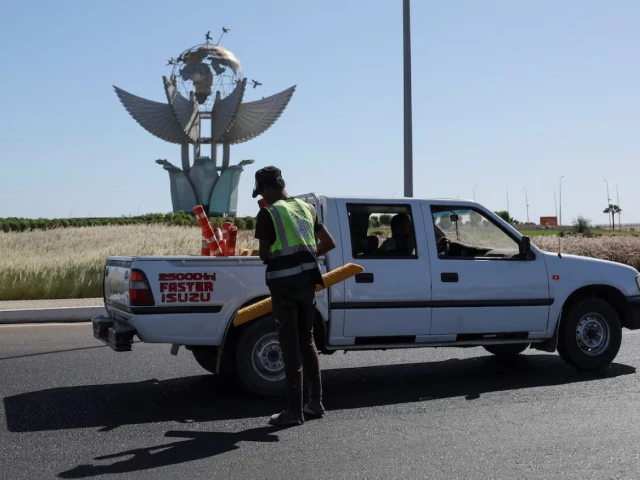Everything you need to know about specific terms used during a period of conflict.
Originally published on Nov 9
After six weeks of relentless Israeli bombardment of Gaza and over 14,000 Palestinian lives lost, Israel and Hamas have agreed to a pause in fighting in exchange for the release of hostages and Palestinian prisoners.
Since Oct 7, Pakistan, the United Nations and other world bodies have been calling for a ceasefire, while Israel-aligned countries, like the United States have urged for a “humanitarian pause”.
The parties in the conflict — and negotiators — are using different terms for the Nov 22 agreement. Israel is calling it a “pause in fighting”, Hamas is calling it a “truce”, while Qatar, which helped negotiate these terms is describing it a “humanitarian pause”.
So what do these terms mean? Why are they different? Are they interchangeable? Here, we try to unpack them for you.
These are some key terms to understand during a conflict, as defined by the UN Office for the Coordination of Humanitarian Affairs and the International Committee of the Red Cross (ICRC).
Ceasefire
United Nations Secretary-General Antonio Guterres has redoubled his efforts for a ceasefire in Gaza, saying most recently that Gaza was becoming “a graveyard for children”, where more than 4,000 have died due to heavy Israeli bombardment.
In a ceasefire, fighting stops, usually agreed upon by the warring parties. A ceasefire typically covers the whole area where the conflict is being waged, and it can lead to a permanent settlement as part of a political solution.
Humanitarian ceasefire/pause
A humanitarian pause in the hostilities between Israel and Hamas would be “a vital step to ease the burden on civilians in Gaza,” according to the New York Times Editorial Board.
A humanitarian pause is a temporary cessation of hostilities, agreed upon by all warring parties, for humanitarian purposes, such as allowing aid to enter an area of active war. It is usually for a defined period and specific geographic area where the humanitarian activities are to be carried out.
Cessation of hostilities
UAE Ambassador to UN Lana Nusseibeh has called for a “cessation of hostilities” at a UN Security Council meeting.
A cessation of hostilities is a temporary stop to the fighting. It can be a stepping stone towards a ceasefire and is designed to pause combat so parties can begin talks with each other.
Humanitarian corridor
Amid the escalating bombardment of Gaza, EU leaders have called for “continued, rapid, safe and unhindered humanitarian access and aid to reach those in need through all necessary measures including humanitarian corridors and pauses for humanitarian needs”.
In humanitarian corridors, specific routes are identified for the safe passage of humanitarian goods from one place to another in an active area of conflict.
Days of tranquility
A temporary time period, used by UN agencies like Unicef and WHO, for medics and other personnel to provide medical attention to children during a conflict. For example, for an immunisation campaign. All parties agree not to interfere with the medical personnel’s work during this time period.
War crimes
Reporters Without Borders (RSF) filed a complaint in the International Criminal Court for war crimes committed against Palestinian journalists in Gaza — the third such complaint since 2018 — and against an Israeli journalist, killed and wounded in the course of their work.
War crimes are a serious breach of international law committed against civilians or enemy combatants during an international or domestic armed conflict.
Truce
A truce is a halt in fighting agreed upon by the belligerents themselves. It is not binding and can come and go during the course of a conflict. Unlike a humanitarian pause, a truce can be called for any reason — it is not restricted to humanitarian purposes.
Armistice
An armistice indicates a formal agreement to end fighting and is not necessarily the end of a war. It could be an attempt at negotiating a lasting peace.
De-escalation
ICRC president Mirjana Spoljaric has voiced shock at the “intolerable level of human suffering” in Gaza and urged all sides to de-escalate, adding that “this is a catastrophic failure that the world must not tolerate”.
De-escalation is a reduction in the intensity of a conflict or potentially violent situation, according to the Collins English Dictionary.
Demilitarised zone
An area which cannot be occupied or used for military purposes by any party during a conflict, which the parties agree upon. Police forces may be stationed in demilitarised zones to maintain order.
Peacekeeping operations/missions
The United Nations organises peacekeeping operations or missions to help countries avoid “recidivism”, which is when adversaries backslide into violence.
For the UN to deploy a peacekeeping operation, it needs both the consent of warring parties and approval from the UN Security Council. Peacekeepers can help avoid recidivism by promoting the rule of law and monitoring elections, for example.
Peacebuilding
Peacebuilding tries to promote sustainable peace by addressing the root causes of conflict and supporting indigenous capacities for peace management and conflict resolution.
Humanitarian access
Humanitarian access is a way for organisations to access people in areas of conflict and provide them with emergency assistance. This can be done by establishing relief corridors or days of tranquillity, but the consent of all parties is required first.
Protection of civilians
South Africa has called for the United Nations to deploy a rapid protection force to protect civilians in Gaza from further bombardment as Israel steps up its retaliation for a deadly attack by Hamas.
Protecting civilians during armed conflict is of utmost priority in international humanitarian law. Civilians are most vulnerable during periods of violence and are most in need of protection and shelter.
International Humanitarian Law (IHL)
UNICEF called the Israeli attacks on the Jabaliya refugee camp in Gaza “horrific and appalling“ and referred to their protected status in IHL.
International humanitarian law refers to a set of rules seeking to limit the effect of armed conflict.
IHL primarily covers two areas: the protection of those who are not taking part in the fighting, and restrictions on the means of warfare, especially the methods and tactics used.
The term is also known as the law of war or the law of armed conflict.
What’s going on right now?
International human rights watchdog Amnesty International denounced five of the attacks Israel carried out against the civilians in Gaza between October 7-12, explaining that the attacks are considered war crimes.
Amnesty International also acknowledged that the recent escalation of atrocities in Gaza are not the full scale of war crimes committed by Israel.
“The five cases presented barely scratch the surface of the horror that Amnesty has documented and illustrate the devastating impact that Israel’s aerial bombardments are having on people in Gaza,” a statement by the group read.
“We are calling on Israeli forces to immediately end unlawful attacks in Gaza and ensure that they take all feasible precautions to minimise harm to civilians and damage to civilian objects.”
The actual number of war crimes committed by Israel since October 7 is estimated to be much higher, according to independent rights groups.
Till now, the United States and other global superpowers like Canada and the UK have not called for a ceasefire in Gaza despite mounting pressure from international human rights groups and civilian protesters across the globe.
United States Secretary of State Anthony Blinken has urged world leaders to call for a “humanitarian pause” in Gaza, but not a ceasefire. According to Blinken, who met with Arab foreign ministers the past weekend, a ceasefire would “simply leave Hamas in place, able to regroup and repeat what it did on Oct 7”.
Blinken expressed interest in a humanitarian pause so that the return of foreign nationals and hostages could be negotiated with Hamas.
International charitable organisation Oxfam has argued that a humanitarian pause simply isn’t enough at this point in time and can potentially cause more harm than good, which is why a ceasefire is the only solution to bring about tangible change.
UN Secretary-General António Guterres said on Monday that “the unfolding catastrophe in Gaza makes the need for a humanitarian ceasefire more urgent with every passing hour.”
The strongest rejection of a ceasefire comes from Israel itself, with Prime Minister Benjamin Netanyahu saying “there will be no ceasefire without the return of the hostages”.
According to military experts, Israeli forces are set to intensify their operations against Hamas, although the time frame for this is unclear.
Despite a comprehensive set of rules and laws dictating how wars should be waged, there has been little regard for these laws by warring groups, and even less enforcement of these laws by the organizations which uphold them.





